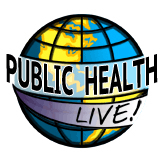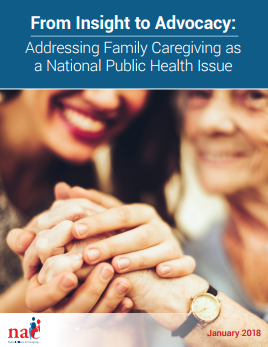February 2018
This Week: Public Health Live! Advance Care Planning Webinar
 On Thursday, a free webinar entitled Advance Planning for Independence and Autonomy will be presented by David Hoffman, Director of the Bureau of Community Integration and Alzheimer’s Disease in the New York State Department of Health. As part of Public Health Live! this webinar will explain the differences between advanced planning and advanced directives, describe the benefits of advanced planning, and highlight current public health efforts to increase it. Join the University of Albany’s School of Public Health on February 15 from 9:00 — 10:00 a.m. EST. Please register in advance. On Thursday, a free webinar entitled Advance Planning for Independence and Autonomy will be presented by David Hoffman, Director of the Bureau of Community Integration and Alzheimer’s Disease in the New York State Department of Health. As part of Public Health Live! this webinar will explain the differences between advanced planning and advanced directives, describe the benefits of advanced planning, and highlight current public health efforts to increase it. Join the University of Albany’s School of Public Health on February 15 from 9:00 — 10:00 a.m. EST. Please register in advance.
An issue brief from the Association of State and Territorial Health Officials (ASTHO) offers related guidance for state health departments, public health agencies, and the health care workforce on advance care planning and end-of-life care. The brief describes advance directives, barriers to completing plans, and opportunities across the public health field to increase use. Additionally, this resource highlights state and local programs and strategies that have been used for supporting the development and implementation of advance care planning initiatives.
Just Released: New Dementia Care Guidelines
 Last month, the Alzheimer’s Association published new dementia care practice guidelines designed to define quality care across all care settings and throughout the course of the disease. These 56 recommendations are intended for professional care providers who work with individuals living with dementia and their families in residential and community-based settings. Last month, the Alzheimer’s Association published new dementia care practice guidelines designed to define quality care across all care settings and throughout the course of the disease. These 56 recommendations are intended for professional care providers who work with individuals living with dementia and their families in residential and community-based settings.
The recommendations offer guidance to best ensure person-centered care for people living with dementia. This includes guidance on detection and diagnosis, assessment and care planning, medical management, support for daily living, education, and support for caregivers. The recommendations also offer guidance to residential facilities to compassionately and effectively manage behavioral symptoms of dementia, maintain appropriate staffing levels, and create therapeutic environments. To minimize unnecessary and unplanned transitions in care — including rehospitalizations and emergency department use — the guidelines identify five essential components of interventions for persons with dementia. These guidelines will help health care systems align with an objective of Healthy People 2020 (DIA-2): reduce the proportion of preventable hospitalizations in adults aged 65 years and older with diagnosed Alzheimer's disease and other dementias.
ROAD MAP DOMAIN
Assure a competent workforce through education, awareness, and training. |
“Since its inception, the Alzheimer’s Association has been a leader in outlining principles and practices of quality care for individuals living with dementia,” said Sam Fazio, Ph.D., lead author and Director of Quality Care and Psychosocial Research at the Association. “These recommendations reflect the most current research and best practices to help ensure high-quality, person-centered care for people living with Alzheimer’s in long-term and community-based settings.”
These guidelines set a course for building a competent Alzheimer’s and dementia care workforce, which is a major focus of the Healthy Brain Initiative Road Map, a public health guidebook jointly developed by the Alzheimer’s Association and the Centers for Disease Control and Prevention to promote brain health, address cognitive impairment, and meet the needs of caregivers.
RAISE Family Caregivers Act Signed into Law
 The Recognize, Assist, Include, Support and Engage (RAISE) Family Caregivers Act of 2017 (H.R. 3759) was signed into law last month. The act directs the Department of Health and Human Services (HHS) to develop a national strategy to provide education and training, long-term services and supports, and financial stability and security for caregivers. The Recognize, Assist, Include, Support and Engage (RAISE) Family Caregivers Act of 2017 (H.R. 3759) was signed into law last month. The act directs the Department of Health and Human Services (HHS) to develop a national strategy to provide education and training, long-term services and supports, and financial stability and security for caregivers.
In addition, the law also creates a Family Caregiving Advisory Council — modeled after the National Plan to Address Alzheimer’s Disease Advisory Council — to provide advice on how the federal government can best support family caregivers. This legislation aligns with a major goal of the Healthy Brain Initiative Road Map — meeting the needs of caregivers for people living with dementia. For additional background, please see this fact sheet.
 Passage of the RAISE Family Caregivers Act accomplishes one recommendation in the new report From Insight to Advocacy: Addressing Family Caregiving as a National Public Health Issue released last month by the National Alliance for Caregiving. This report outlines the major burden faced by family caregivers around the country and offers recommendations for advocates, health systems and policymakers to meet this growing demand. Read the full report. Passage of the RAISE Family Caregivers Act accomplishes one recommendation in the new report From Insight to Advocacy: Addressing Family Caregiving as a National Public Health Issue released last month by the National Alliance for Caregiving. This report outlines the major burden faced by family caregivers around the country and offers recommendations for advocates, health systems and policymakers to meet this growing demand. Read the full report.
Researcher Spotlight: Exercise Outcome Measures
 This edition of Alzheimer’s Public Health News features a new spotlight on insightful work coming from the Healthy Brain Research Network (HBRN). Created by the Centers for Disease Control and Prevention (CDC) to further advance the Healthy Brain Initiative, the HBRN is a thematic public health research network that comprises the collaborative strengths, expertise and diversity of its core academic institutions and community and public health partnerships. Learn more about the HBRN. This edition of Alzheimer’s Public Health News features a new spotlight on insightful work coming from the Healthy Brain Research Network (HBRN). Created by the Centers for Disease Control and Prevention (CDC) to further advance the Healthy Brain Initiative, the HBRN is a thematic public health research network that comprises the collaborative strengths, expertise and diversity of its core academic institutions and community and public health partnerships. Learn more about the HBRN.
This inaugural spotlight features new research published in the Journal of Geriatric Physical Therapy on physical functioning among people living with Alzheimer’s and other dementias.
Peer-Reviewed Publication: Physical Performance Tests for Dementia
Have you ever wondered the best way to determine if exercise programs make a difference on physical functioning for people with cognitive impairment? Alzheimer’s and other dementias not only affect cognitive abilities, but also physical functioning in a progressive manner. Physical performance tests are one way to evaluate whether and how much an exercise program helps reduce declines in physical functioning.
Important domains of physical performance include fitness, functional mobility, gait, balance, and strength. In a scoping review of 20 physical performance tests across 48 articles, the authors recommend using the following five physical performance tests with people living with mild to moderate dementia:
- Fitness: six-minute walk test
- Functional mobility: repeated chair stand tests
- Gait: short-distance (e.g., six meters) gait speed
- Balance: Berg Balance Scale
- Strength: isometric strength measured by a strength dynamometer
Public health practitioners can incorporate these performance outcome measures into physical activity interventions for people experiencing cognitive impairment. And, researchers can select from the recommended measures that work best for people with cognitive impairment to measure how exercise affects a person’s fitness level, ability to move, walking capability, balance and muscle strength.
Updated Guidelines on Exercise and MCI
 The American Academy of Neurology released updated clinical guidelines for persons with mild cognitive impairment (MCI) and included — for the first time — a specific recommendation for people with MCI to engage in regular physical activity. The American Academy of Neurology released updated clinical guidelines for persons with mild cognitive impairment (MCI) and included — for the first time — a specific recommendation for people with MCI to engage in regular physical activity.
ROAD MAP ACTION ITEM E-04
Coordinate national and state efforts to disseminate evidence-based messages about risk reduction . |
The guideline encourages twice-weekly exercise among people with MCI to help maintain cognitive functioning, based off of emerging research. The public health community can disseminate these new evidence-based guidelines throughout the health care field, consistent with Road Map action E-04.
Educational Videos: Communicating with People with Dementia
 In a series of three videos, Communicating with People with Dementia: Understanding their Selfhood, professor emeritus of psychology at Georgetown University and author Dr. Steven Sabat speaks about the importance of language in communications with persons with Alzheimer’s and other dementias. He describes how the words we choose can lessen the social stigmas associated with dementia. Stories illustrate different communications choices with regards to the selfhood of people with dementia. The three-part series covers: In a series of three videos, Communicating with People with Dementia: Understanding their Selfhood, professor emeritus of psychology at Georgetown University and author Dr. Steven Sabat speaks about the importance of language in communications with persons with Alzheimer’s and other dementias. He describes how the words we choose can lessen the social stigmas associated with dementia. Stories illustrate different communications choices with regards to the selfhood of people with dementia. The three-part series covers:
- The Effects of Labeling Relationships (part 1)
- The Value of Individuality (part 2)
- Normal Behaviors Post-Diagnosis (part 3)
ROAD MAP ACTION ITEM E-06
Identify
and promote strategies for communicating effectively and sensitively with persons with dementia. |
The Healthy Brain Initiative Road Map calls for public health to help the public and professionals communicate effectively and sensitively with people with dementia. Public health practitioners can use this educational resource to ensure they interact compassionately and appropriately with people living with dementia. Please visit our Public Health Playlist on YouTube for additional videos on the intersection of public health and Alzheimer’s.
The Alzheimer’s Public Health E-News is supported (in part) by Cooperative Agreement #5 NU58DP006115-03, funded by the Centers for Disease Control and Prevention (CDC). Its contents are solely the responsibility of the authors and do not necessarily represent the official views of the Centers for Disease Control and Prevention or the Department of Health and Human Services.
For subscription services or to view previous issues of Alzheimer’s Public Health News, please visit http://alz.org/publichealth/public-health-news.asp or contact John Shean (jshean@alz.org).

|